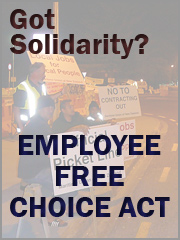The racist attack against Harvard Professor Henry Louis Gates Jr. has put disorderly conduct laws in the spotlight. They were used to arrest him for doing absolutely nothing wrong. Massachusetts Criminal Defense Resource Page describes the law in that state.
A "disorderly person" is defined as one who:
* with purpose to cause public inconvenience, annoyance or alarm, or
* recklessly creates a risk thereof
* engages in fighting or threatening, violent or tumultuous behavior, or
* creates a hazard or physically offensive condition by any act which serves no legitimate purpose.
This is incredibly vague. Criminal Law Lawyer Source describes the dilemma created by disorderly conduct laws in general:
Given the wide range of behaviors that could constitute disorderly conduct, a person may be arrested for this crime without proper cause. Virtually any socially offensive or disruptive conduct may be prosecuted as disorderly conduct.
These vague laws would be bad enough if cops always made accurate police reports. However, police reports in police misconduct cases are notorious for not being worth the paper they are written on.
To put it bluntly, disorderly conduct laws function as "I'm arresting you because I feel like it" laws.
Wikipedia describes the constitutional law concept of Void for Vagueness as follows:
Void for vagueness is a legal concept in American constitutional law that states that a given statute is void and unenforceable if it is too vague for the average citizen to understand. There are several ways, senses or reasons a statute might be considered vague. In general, a statute might be called void for vagueness reasons when an average citizen cannot generally determine what persons are regulated, what conduct is prohibited, or what punishment may be imposed. Again, though, there are specific ways a lawyer might make a void for vagueness argument.
Disorderly conduct laws are certainly vague enough to where you don't really know which conduct is prohibited and which conduct is acceptable. Even worse, personal feelings about the targeted person play an inherent role in what is considered a "public inconvenience" or "socially offensive." Disorderly conduct laws are deliberately written to be unconstitutionally vague in order to expand police powers beyond those tolerated in a society governed by the rule of law.
The failure of courts to strike down disorderly conduct laws and the fact that such laws get passed in the first place put a spotlight on the authoritarian tendencies within our legal system and in our society as a whole.











Police use the "disorderly conduct" statute as a kind of "garbage can" crime when they can't figure out anything else to charge someone with. Often, it involves an attempt to suppress the expression of 1st Amendment rights.